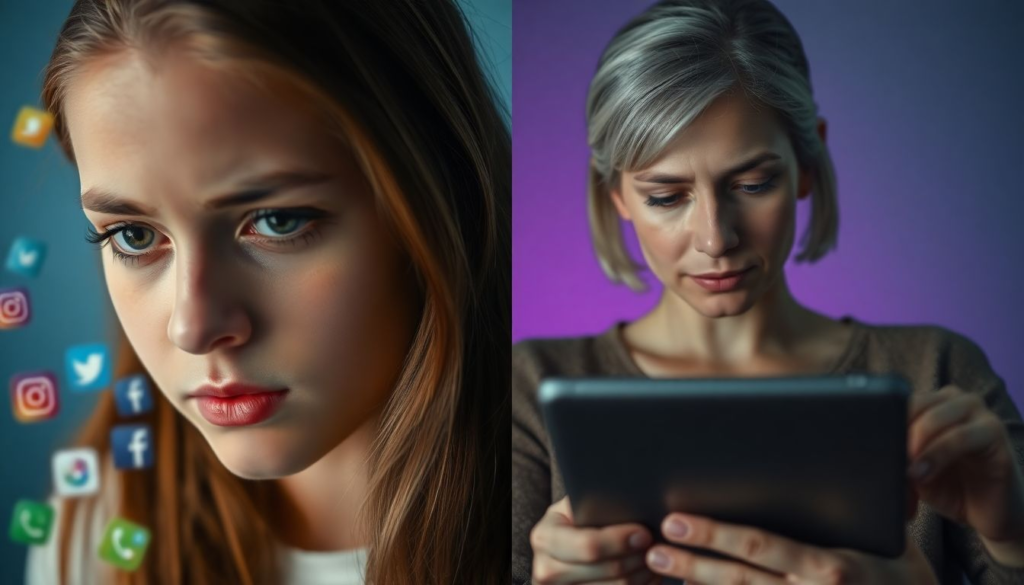
Social media has become a constant presence in our lives, influencing how we connect with others, share our experiences, and perceive the world. With the prevalence of platforms like Instagram, TikTok, and Facebook, more people, especially teens and adults, are accessing these tools daily. This growth has raised concerns about how social media affects mental health in different age groups. While both teens and adults can feel its impact, the ways in which they experience emotional and psychological effects vary widely.
Social Media’s Impact on Adolescent Mental Health
Increased risk of anxiety and depression among teens
Studies reveal that social media plays a significant role in rising rates of anxiety and depression among adolescents. Research indicates that nearly 25% of teens experience symptoms of depression, often linked to their social media habits. The more time teens spend online, the more likely they are to feel negative emotions about themselves and their lives.
Cyberbullying, body image issues, and social comparison
Platforms like Instagram and TikTok can become breeding grounds for negative experiences. Teenagers often face cyberbullying, leading to anxiety, depression, and even self-harm.
- Body image issues: Social media is filled with idealized images that can distort teens’ views of themselves. A survey found that 70% of girls stated social media made them feel pressured to look a certain way.
- Social comparison: Many teens compare themselves to others, leading to feelings of inadequacy. For example, a teen might see a friend’s glamorous vacation photos and feel their own life doesn’t measure up.
Strategies for promoting positive social media use in teenagers
To foster a healthier relationship with social media, experts recommend these strategies for teens:
- Set time limits: Encourage teens to limit their social media use to prevent excessive exposure.
- Curate feeds: Help them follow accounts that promote positivity and self-acceptance.
- Talk openly: Create a safe space for teens to discuss their online experiences and feelings.
Social Media’s Impact on Adult Mental Health
Correlation between social media use and feelings of loneliness
Adults are also affected by social media. Many report feelings of isolation, despite being “connected.” A recent study highlighted that 43% of adults feel lonely due to social media use. The problem often arises when online interactions replace real-life connections.
The impact of social comparison and FOMO on adult well-being
For adults, social media can amplify feelings of inadequacy through social comparison and FOMO (fear of missing out).
- Social comparison: Adults may compare their careers, relationships, and lifestyles with those portrayed online, leading to dissatisfaction.
- FOMO: Many adults feel excluded from gatherings or events they see online, which can heighten feelings of loneliness and anxiety.
Strategies for managing social media use to protect adult mental health
Adults can adopt these practices to safeguard their mental well-being:
- Moderate use: Consider time limits for social media use to balance online and offline life.
- Be selective: Unfollow accounts that provoke negative feelings or comparisons.
- Seek real connections: Prioritize in-person interactions with friends and family.
Comparing the Impacts: Developmental Differences
Neurological development and vulnerability
Teens and adults have different brain structures that affect how they engage with social media. Research shows that teenagers’ brains are still developing, particularly in areas connected to decision-making and risk assessment, making them more susceptible to the influences of social media.
Different coping mechanisms and resilience levels
While teens may lack life experience to cope effectively, adults generally have better coping strategies. They might have built resilience over time, enabling them to handle social media’s pressures more effectively.
The role of social support networks
Social support can help mitigate social media’s negative impacts. Teens benefit from peer support, while adults often rely more on family, friends, or professional networks.
The Role of Content and Platform
How different platforms affect mental health differently
Different social media platforms can have unique effects on mental health. For instance:
- Instagram: Focuses heavily on visuals, often leading to body image issues.
- Facebook: Can foster a sense of connection yet may also lead to feelings of inadequacy through comparison.
The impact of specific content types
Content can greatly influence mood and self-esteem. Curated content often showcases idealized lives, while authentic content can promote realistic expectations and positivity.
The influence of algorithms
Social media algorithms tailor content to users, which can enhance feelings of loneliness if they continually see content that does not resonate with them.
Conclusion: Navigating Healthy Social Media Use
Social media affects teens and adults in distinct ways. It’s crucial to recognize these differences to promote healthy use for both age groups. Parents should communicate openly with their teens about online challenges, while adults can benefit from setting boundaries.
Moving forward, the ongoing research into social media’s long-term effects on mental health is vital. By understanding these influences, we can create healthier digital experiences for everyone.
Take action by evaluating your social media habits today. Whether you’re a teen or an adult, reflect on how your time online could be affecting your well-being.







